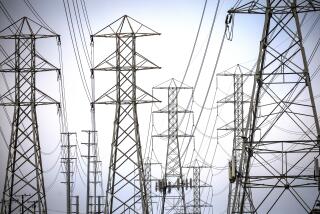Stateâs Utilities Cut Conservation Effort, Study Says
A national environmental group Thursday released a study showing that Californiaâs big utilities, which once led world conservation efforts, have cut such programs by more than half, a turnaround that the group warned could cost Californians both in energy bills and environmental damage.
According to the study by the Natural Resources Defense Council, Southern California Edison Co., Pacific Gas & Electric and two other utilities have slashed their spending on conservation programs by 56% since 1985, watering down or abandoning programs once internationally touted for reducing business, residential and agricultural energy waste.
Boosting Fossil Fuel Use
The group, which led the recent fight against the use of the chemical Alar on apples, warned at a San Francisco press conference that the utilitiesâ policies are needlessly boosting the burning of fossil fuels amid increased concerns over urban smog and global warming.
âCaliforniaâs utilities were once the worldâs most effective energy conservation promoters, and we desperately need them to resume that role,â said attorney Ralph Cavanagh, co-director of the groupâs energy program.
While California still leads other states in cumulative energy savings resulting from the innovative policies of the 1970s and early 1980s, huge losses to consumers were predicted by the group if the utilities fail to adopt improved energy-saving techniques and incentives such as bonuses for conservation achievements.
Bills Could Be Cut
Cavanagh said California utilitiesâ conservation programs saved consumers $500 million a year through 1985, but they could cut bills by an additional $1 billion a year by reinstating old programs and adopting new ones.
Severe reductions in Californiaâs energy conservation efforts were first detailed in January by The Times. However, the six-month study released Thursday, based upon data from the California Energy Commission, shows the cuts to be even deeper and for the first time reveals how much energy is no longer being saved.
The California Public Utilities Commission, under increasing public pressure, has announced that it will look into the cuts and proposals for conservation reform at a hearing July 20.
âWe all need the (PUC) regulators to focus their attention on this collectively and say, âOh my God, we never intended this,â â Cavanagh said. âI have every hope they will do that July 20.â
In recent months, Edison has argued that it is not in the business of addressing âsocial engineeringâ questions such as the environment. Executives of the big utilities have portrayed their cutbacks in conservation as the cost-effective thing to do in the face of relatively cheap and plentiful energy.
H. Fred Mickelson, manager of customer energy service at Edison, said Thursday that the utility welcomes public discussion over whether conservation efforts should be increased. But, he added, âI take a little umbrage with that portrayalâ of Edison as abandoning its role in conservation.
Edison is spending about $37 million this year on energy conservation, down from a high of $63 million in 1984. Mickelson said the company in the last 12 years has saved enough energy to avoid building two additional large generating plants. The company, he added, will save enough energy in the next decade to avoid building any new plants, although some existing facilities will be expanded.
âIt is true that there are less dollars being spent (on conservation) these days than there were during the oil crisis,â Mickelson said.
However, he said, âI believe that with the huge issues of global warming--something that neither utilities nor environmental groups nor regulators can answer themselves . . . we need to get together and talk these issues over.â
Dennis Whitney, assistant division head for system development at the Los Angeles Department of Water and Power, said that while his agency is not regulated by the PUC, âwe will watch to see what they come up with and may adopt new programs if appropriate.â
Among other things, critics say utilities in the Los Angeles area have relied heavily on home conservation and weather-proofing programs long considered outmoded and inefficient by some independent conservation experts.
Edison, for instance, has widely promoted the idea that Los Angeles County is now nearly saturated by utility company weather-proofing programs, and that relatively few homes require further insulation.
However, Edison and other utilities have relied almost entirely upon attic insulation and weatherstripping of doors and windows, ignoring so-called âsuper-weatherizingâ techniques that have proven vastly more effective in Southern California and elsewhere.
Amory Lovins, a conservation expert based in Colorado, said super-weatherizing, which in part uses an air-suction technique to detect unseen house leaks and correct them, can reduce the combined summer and winter energy bills for Los Angeles homes by 50%.
The utilities have claimed that such techniques are untested, but in fact they have been in wide use in Canada and in some areas of the United States for most of this decade, and are available through specialty contractors in Southern California.
More to Read
Sign up for Essential California
The most important California stories and recommendations in your inbox every morning.
You may occasionally receive promotional content from the Los Angeles Times.






![[20060326 (LA/A20) -- STATING THE CASE: Marchers organized by unions, religious organizations and immigrants rights groups carry signs and chant in downtown L.A. "People are really upset that all the work they do, everything that they give to this nation, is ignored," said Angelica Salas of the Coalition of Humane Immigrant Rights. -- PHOTOGRAPHER: Photographs by Gina Ferazzi The Los Angeles Times] *** [Ferazzi, Gina -- - 109170.ME.0325.rights.12.GMF- Gina Ferazzi/Los Angeles Times - Thousands of protesters march to city hall in downtown Los Angeles Saturday, March 25, 2006. They are protesting against House-passed HR 4437, an anti-immigration bill that opponents say will criminalize millions of immigrant families and anyone who comes into contact with them.]](https://ca-times.brightspotcdn.com/dims4/default/34f403d/2147483647/strip/true/crop/1983x1322+109+0/resize/840x560!/quality/75/?url=https%3A%2F%2Fcalifornia-times-brightspot.s3.amazonaws.com%2Fzbk%2Fdamlat_images%2FLA%2FLA_PHOTO_ARCHIVE%2FSDOCS%2854%29%2Fkx3lslnc.JPG)



